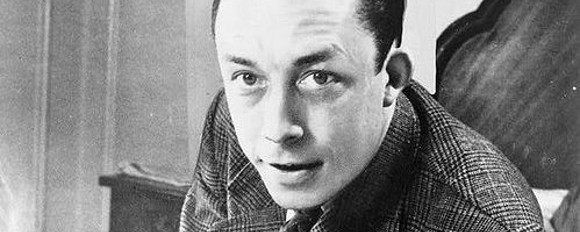Crazy for Camus
Sisyphus, the mythological boulder-lifter synonymous with futility, might seem an unlikely hero for the bright-eyed Philosophy major Rachel Silverbloom. But in contemplating the figure through the lens of Albert Camus’s philosophical essays, she has found a sense of intellectual purpose and an uncompromising, personal vision.

Since last summer, Silverbloom has been refining and rewriting her essay, “Sisyphus Smiles: An Absurd Guide to Happiness,” first as a Summer Undergraduate Research Experience (SURE) project and now as an independent study and Honor’s Program senior thesis. In between, she has presented her work at a national Camus conference and served as a guest lecturer for Philosophy Professor David Appelbaum’s course on Existentialism.
Silverbloom is equal parts starry-eyed fan of the dashing, Algerian journalist, novelist and philosopher (“I love Camus. I have a weird, intellectual crush on him”), and a devoted scholar intent on bringing a nuanced reading to his controversial essay, “The Myth of Sisyphus.”
In the essay, Camus argues that Sisyphus embodies the absurd hero because he recognizes that he is of the earth, and the master of his fate. “Each atom of that stone, each mineral flake of that night filled mountain, in itself forms a world,” Camus writes. “The struggle itself toward the heights is enough to fill a man’s heart. One must imagine Sisyphus happy.”
Silverbloom believes Camus takes an “optimistic spin” on the work of Nietzsche and other Existentialists. Although Camus rejects the notion of a transcendent afterlife, he nonetheless finds that “this isn’t a reason to give up on life,” said Silverbloom. She agrees that “When you realize this is it, that’s a freeing thing, because you have the unique opportunity to create your own values and live your own passions.”
“When you spend so much time with a text and with something you’ve written, you can look at your ideas objectively.”
Philosophy Associate Professor Daniel Werner mentored Silverbloom during her eight-week SURE project, for which she earned a research stipend. Silverbloom completed a lengthy draft essay and gave a fifteen-minute public presentation on her work to conclude the project.
In the fall, at Werner’s suggestion, Silverbloom applied for a $750 Undergraduate Research Experience Travel Award to present at a Camus conference in Eerie, Pennsylvania, where she was the only undergraduate student on the program. Professors attending the conference complimented Silverbloom’s work and followed up with email requests for a copy of her essay. “It was a great networking experience,” she said.
Silverbloom aspires to earn a PhD in Philosophy and become a university professor, specializing in twentieth-century French and German philosophy. Werner believes the conference gave Silverbloom greater insight into what her career path entails. “It gave her a sense of what it’s like to work in academia and be a scholar. I think it was very good for building her self-confidence,” he said.
Silverbloom and Werner meet weekly to discuss Silverbloom’s independent study. Silverbloom finds that her immersion in Camus’s essays and in the secondary literature has developed her critical reading and writing skills: “When you spend so much time with a text and with something you’ve written, you can look at your ideas objectively,” she said.
Pursuing an in-depth study of Camus’ writings has enriched Silverbloom’s undergraduate experience, and also affirmed deeply-felt beliefs she was not able previously to articulate. “Camus brings eternity to a place that’s finite, that we can actually hold and understand. It has given me all the more reason to have the confidence to live the kind of life I want to live and not feel trapped into pursuing a career or any kind of situation that I don’t feel passionate about,” she said.
In developing her own personal philosophy, Silverbloom differentiates herself from those who look for the monetary and material rewards of advanced study. “One of the things it’s taught me is that’s not what I value. Those aren’t the things that are going to make life have meaning,” she said.
Doing challenging, inspiring work guided by Werner and a tightly-knit Philosophy faculty has yielded far greater rewards. “My experience as a philosophy major has confirmed through its own teachings, that this is where I’m supposed to be. I feel like I belong here,” she said.
-Despina Williams

